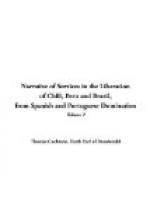My object in so doing was—that as we had only taken part of the troopships destined for Maranham, it was quite possible—as that port lay to leeward—that the remainder might even yet reach their destination; and as the Portuguese authority still existed in that—as throughout all the Northern provinces—they might again be armed and equipped. The instructions of the Portuguese admiral were, moreover, that, in case of separation, they were to rendezvous at the island of Fernando de Noronha, near which they were fallen in with some days afterwards; so that there were good grounds for anticipating the possibility of their yet reaching their original destination. Instead, therefore, of following the enemy’s squadron farther, I thought we should better serve the interests of Brazil by proceeding direct to Maranham, with the double purpose of being beforehand with the enemy’s troops, should the attempt be made—and, if practicable, reducing the province to the authority of the Emperor; a proceeding which, though not within my orders, was, as I conceived, nevertheless of great importance. Accordingly, quitting the Portuguese fleet and convoy, during the obscurity of night, we made straight for Maranham.
Thus were the Northern provinces entirely rescued from the designs of this armament, which—luckily for the consolidation of the empire—I had been enabled to frustrate; so that the cause of independence became free to develop itself throughout its whole extent. It is satisfactory to record the fact, that the whole military force was captured or dispersed, and its objects averted—by a single ship—without the loss of a man on our part—or the additional cost of a dollar to the Imperial Government; though, when we left Rio de Janeiro, it was believed that such objects could only be effected by costly naval and military expeditions combined.
During this chase, as I have said, it did not appear a national object to make captures, though many were secured—as officers and seamen must have been detached for the purpose, thereby diminishing our efficiency for the annexation of those provinces where the Portuguese authority was still intact; to accomplish which—though such result was not expected by the Government—I had formed plans during the pursuit. Considering that zeal for Brazilian interests would be better shewn by expelling the enemy which remained, I therefore refrained from taking possession of many valuable ships, otherwise completely at our mercy, though not having done so—then (previous to my experience of the Court of Admiralty) seemed a heavy pecuniary loss to myself, the officers, and crew. Such sacrifice should have secured us better treatment than we subsequently endured from the Administration of a country whose entire independence was thus obtained by our personal sacrifices.
The means of intimidation employed for the expulsion of the Portuguese from Bahia—the pursuit of the enemy’s fleet—and the disabling of the troopships destined for Maranham—acts altogether in excess of the Imperial instructions—not only freed the Northern provinces from the enemy, but, as before stated, saved the Brazilian Government the delay, expense, and uncertainty of powerful expeditions.




